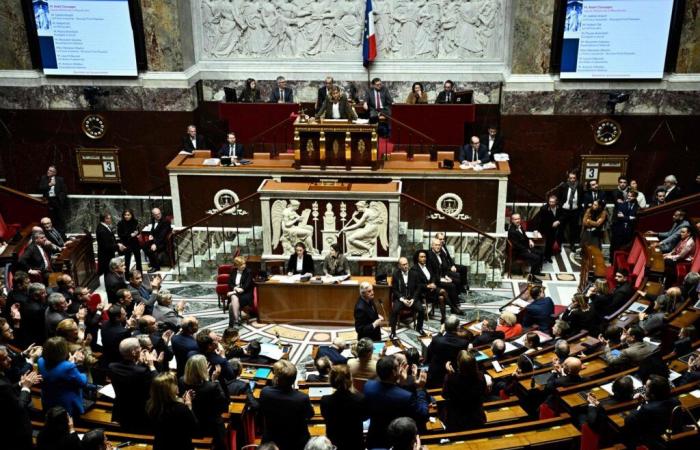Michel Barnier could, Wednesday December 4, enter the history of the Ve Republic. He would be the first head of government overthrown by a motion of censure after having incurred his responsibility, by activating article 49.3 on the Social Security financing bill (PLFSS), Monday December 2.
If confirmed, such a scenario would plunge the country into a new period of political uncertainty, opening the way to other new configurations, due to the particular context in which it takes place. Risks of blockage, exit doors, future of the budget… Overview of the main questions raised by the political crisis.
Is the Prime Minister obliged to resign if a motion of no confidence is adopted?
According to article 50 of the Constitution, when the National Assembly adopts a motion of censure, the Prime Minister “must” submit his resignation to the President of the Republic. “There is no ambiguity about the fact that the government immediately resigned” if such a motion is adopted, specifies Constitution specialist Julien Boudon, professor of public law at Paris-Saclay University. “No deadline is set, but it would be difficult to understand if the presentation of his resignation to the Head of State is not immediate”agrees Stéphanie Damarey, professor of public law at the University of Lille.
What would become of the bills tabled by the Barnier government?
If the government is overthrown, all the texts currently under examination will be immediately buried, believe several jurists interviewed by The World. Starting with the budgetary texts under discussion in Parliament, and the most emblematic of all, the finance bill (PLF) for 2025. “The government could only ensure the dispatch of “current affairs””, assure Aurélien Baudu, professor of public law at the University of Lille, and his colleague from Paris-Cité University, Xavier Cabannes. “If there is a fall of the government, it’s over, the texts fall, they are null and void,” agrees Julien Boudon.
Unlike his colleagues, Mathieu Carpentier, professor of public law at Toulouse-Capitole University, argues that “nothing in our recent parliamentary history justifies maintaining that the overthrow of the government renders its texts obsolete”. The only victorious motion of censure, voted in October 1962 against the Pompidou government, was followed by a dissolution of the National Assembly “which rendered all the pending texts obsolete”continues the lawyer. But the situation is different today, because the President of the Republic cannot call legislative elections before July 2025, at the earliest.
Is there a risk of a budget shutdown?
In the event of government censorship, the chances of Parliament adopting a budget for 2025 would decline. The deadlines are in fact too tight for a new project prepared by a future government to be examined by the National Assembly and the Senate. before December 31.
If the possibility that the State will not be able to incur expenses or collect revenues on 1is January is a technically possible scenario, safeguards are planned by the French legal system to prevent what would be akin to the American shutdown – which designates the cessation of government activities in the absence of agreement on the budget. This configuration has never occurred in the history of the Ve Republic.
What realistic scenarios would allow the State to continue operating in 2025?
In the absence of a voted and promulgated budget by the end of the year, the new government (or the resigning government) could request “urgently to Parliament the authorization to collect taxes and + by decree the appropriations relating to voted services »as provided for in paragraph 4 of article 47 of the Constitution.
This special law, the terms of which are specified by article 45 of the organic law relating to finance laws (LOLF), would make it possible to provisionally renew for 2025 the expenditure and revenue of the 2024 budget. The National Rally (RN) has already left hear that he would vote for a special bill, which would allow “at a minimum the renewal of the 2024 budget, pending a new government and a formal finance law”, explained Marine Le Pen, the head of RN deputies, in a column at Figaro.
The World
Support an editorial staff of 550 journalists
Unlimited access to all our content from €7.99/month for 1 year.
Subscribe
This solution would, however, only be short-lived, especially in a context of a spiraling deficit. A certain number of budget lines would increase mechanically, such as the remuneration of civil servants. In the absence of an upward revision of the income tax scale to take into account inflation, “all French people would pay more taxes”also warned the Minister of the Budget, Laurent Saint-Martin, Wednesday November 27, on France Inter.
Finally, political uncertainty fuels investor mistrust: it contributes to raising the interest rates at which France borrows (already high), and can have repercussions on the stock market and the entire economy. The new government would therefore have every interest in tabling as quickly as possible a new finance bill for 2025, which would replace, once adopted by Parliament, this “automatic” budget.
Read also | If the Barnier government is censored, what future for the 2025 budget?
Read later
Theoretically, the President of the Republic has the power to appoint the person of his choice to Matignon. He has no legal obligation to choose a member of the largest group in the National Assembly. However, institutional logic does not allow it to override the opinion of the majority of deputies, since a government which goes against them could be quickly overthrown by a motion of censure. The head of state is therefore supposed to choose a candidate likely to obtain the support of a majority of deputies – or at least not to arouse the rejection of a majority of them.
Nothing would prevent Emmanuel Macron from renaming Michel Barnier, even if the latter had just been censored by the deputies.
Read also | Article reserved for our subscribers Emmanuel Macron is already looking for a replacement for Michel Barnier, a prime minister on borrowed time
Read later
What is technical government?
If the situation is blocked, the appointment of a “technical” government could become a way out. This involves appointing ministers without partisan affiliation to manage current affairs and implement certain consensual reforms, with the support on a case-by-case basis from the different political blocs in the Assembly.
This configuration, which Italy has already experienced several times in moments of crisis, has never been very durable. It is difficult, in fact, for such an executive to maintain its position over time due to lack of legitimacy at the ballot box. Above all, this hypothesis would quickly come up against the difficulty of developing a new budget for 2025, while the different political groups were already struggling to find consensus on budgetary texts in recent weeks.
What is a government in charge of current affairs?
When a prime minister resigns but his successor has not yet been appointed, he and his ministers remain temporarily in office to “manage current affairs”, that is to say, to ensure the continuity of the State, its services, and therefore the essential and daily functioning of the administrations placed under their responsibility. “A resigning minister is no longer really a minister, but acts as a minister, he cannot do anything, there are limits to his power”specified at Monde Benjamin Morel, lecturer in public law at the University of Paris-Panthéon-Assas, in July 2024.
A government responsible for handling current affairs cannot, in principle, take measures of a political nature: it cannot create new rights and duties for the population, take measures which are not already provided for by existing laws and promulgated, or make important appointments. But he can issue decrees, circulars and orders to implement laws already passed.
No legal text specifically governs what a resigning government can or cannot do. This is a traditional principle of public law dating back to the IIIe Republic, which asserted itself through practice. But due to the lack of precedents, the case law is thin. “The border is difficult to establish, because it falls within the discretion of the Council of State », noted last summer, the constitutionalist Dominique Rousseau. The Council of State has the power to contest a decree if it judges that the measure exceeds the objective of maintaining the continuity of public services.
The powers of a resigning government, on the other hand, are not limited when the measures taken are of an urgent nature. In the event of censure from his government, this emergency exception could allow the Barnier government to present, before the end of the year, a special bill authorizing it to continue to collect existing taxes until the vote of the finance law of the year.
When can the next dissolution of the National Assembly take place?
Returning to the polls generally appears as an option to clarify or resolve a tense political situation. But, in the present case and for the time being, this hypothesis is in principle excluded. Article 12 of the Constitution prohibits proceeding “to a new dissolution in the following year” the previous election.
The National Assembly elected in July 2024 is therefore supposed to sit at least until next summer. For public law professor Julien Boudon, “the new dissolution could only take place, at best, on July 8, 2025, one year after the second round of the last legislative elections” – which would involve getting the French to vote at the end of July or mid-August, in the middle of the summer holidays.






